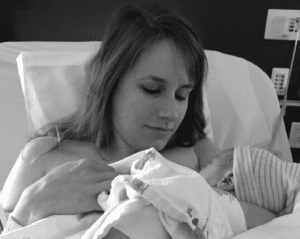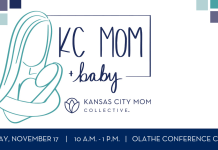Whether it’s your first baby or your fifth, healing emotionally and physically from birth can be daunting. As my husband and I gear up to welcome our second baby, I am keenly aware of this. Though I’m excited to finally meet our little girl, in the back of my mind I know that the postpartum emotions, physical exhaustion, discomfort and pain are also just around the corner. While I’m running around prepping my daughter’s nursery and washing tiny pairs of leggings, I’m making mental notes of resources I’ll need to reach for in the days and weeks after her birth.
There is a lot of great advice floating around when it comes to navigating the postpartum season. Whether you’re looking for a comprehensive list of postpartum resources available in the Kansas City area, or are dealing with something heavy like postpartum depression or even infant loss, there are many local resources available to help you along your journey.
For me, there are definitely a few resources that stood out as extra helpful during the first few months after birth, and even a year out and beyond. Here are my top four postpartum resources that I’m going to have in my back pocket for baby #2:

- Local Facebook mom groups
Don’t roll your eyes just yet; local Facebook mom groups are a great place to connect with moms from your immediate area, get feedback on specific medical providers, gather recommendations for local products, trouble-shoot parenting dilemmas, find baby-friendly events, and discover other local resources that might be useful to a new mom. The search function in these groups also allows you to search keywords or topics to see what other people are talking about. Joining a local group can be an excellent resource to have in the back of your mind as you navigate the months following the birth of a new baby. Be sure to check out our KCMB Neighborhood Mom Groups to help you connect with moms in your local area. I also like Mom Life – Kansas City and OMamas, a group started by Ashley Walburn of Home Holistic (see below).
- Local breastfeeding support groups
When my son was born, he latched beautifully, but I was having some trouble with pain on my left side. Home Holistic, a family wellness center in downtown Overland Park, offers a free weekly breastfeeding support group, so I decided to attend one. The lactation consultant there was super helpful to me, showing me better ways to hold my baby and how to help him suck without getting too much air. It was there that it was also suggested to me that my baby may have a tongue tie (more on that below). Although I didn’t attend more than one or two breastfeeding support groups (leaving the house with a baby who hates car seats is hard), the ones I did attend were very helpful. I also walked away from these groups with a full heart, feeling less alone in my motherhood journey. The Kansas City area has many wonderful breastfeeding support groups—the hospital I delivered at also offers a breastfeeding support group, as do many local hospitals in the Kansas City area.
- Lip and tongue tie revision resources
The topic of tongue ties deserves a post all its own, but I’ll just scratch the surface here: when my son was born, we had no obvious issues with breastfeeding. Both the pediatrician and the lactation consultant at the hospital checked his mouth and told me he did NOT have a tongue tie, or anything else to be concerned about. But eventually, I started having the aforementioned pain on my left side during nursing sessions. My baby was also nursing every 30 minutes, which was exhausting and frustrating, as I could barely go to the bathroom and get a snack before he needed to nurse again.
Once it was suggested to me that he might have a tongue tie (despite what I was told at the hospital), I started researching like crazy—and one of the things I discovered is that many pediatricians and lactation consultants are not trained to recognize ties, which means that many tied babies go undiagnosed. In order to get a diagnosis, I ended up going to see Dr. Suzanne Wolverton at Home Holistic in Overland Park. Dr. Suzanne diagnosed my baby with a significant tongue tie and a moderate lip tie, and recommended a few providers who could revise them. Around this same time, I also reached out to a lactation consultant trained in tongue ties, Liz’s Lactation Services. Liz came to my house and assessed my baby and his latch right there on my couch. She confirmed what Dr. Suzanne said: that he did likely have a tongue tie as well as a mild lip tie. She, too, suspected that the tongue tie was likely the reason he was eating every 30 minutes (he was having trouble getting enough milk in one feeding), and that it could also be the catalyst for the pain I was experiencing on my left side.
With this new information, my husband and I did lots of research on tongue and lip ties, and considered heavily whether or not to revise one or both. After many hours of research and discussion, we decided to revise the tongue tie but not the lip tie. We settled on an ENT provider at Children’s Mercy, and lined up after care assessment and exercises with Dr. Alyssa Younger, a chiropractic specialist trained in tongue ties and infant care at First Choice Chiropractic. If you’re not familiar with tongue ties, many providers ask you to do post-revision stretches on your baby, which can be painful for the infant (and are obviously hard on the parents as well). What drew me to Dr. Alyssa is her “gentle stretch” approach, which involves no pain for the baby and can be made into an enjoyable game. To this day, I am so grateful to Dr. Alyssa for her gentle approach to post-revision care. My son’s tongue tie revision healed beautifully, and the after care was easy and painless for all of us.
Since tongue ties are largely genetic, I fully expect to have to deal with one again once my daughter is born. Thankfully, now that I’ve done my research and have a team of trusted providers at my fingertips, the impending experience doesn’t feel nearly as scary as it did with my first baby.
- Pelvic floor therapy services
Whether you had a C-section or a vaginal birth, many women experience pelvic floor issues after having a baby. Pelvic floor therapy can address a whole host of issues you probably never thought were related to the pelvic floor muscles! Turns out, those pelvic floor muscles are important to everyday life.
Since I was still having pain close to a year after my son was born, my OB referred me to Foundational Concepts, a pelvic floor specialty therapy center with multiple locations throughout the Kansas City metro. After just a couple of months of sessions, I could tell a huge difference, and the pain I was experiencing began to diminish.
—
I am hoping that, since this is my second baby, maybe I won’t feel quite so overwhelmed, and maybe I’ll have just a little more mental capacity than I did last time (moms of 2+ kids, feel free to laugh—I’m just dreaming, at this point!). If I can swing it, I would love to attend some mommy and me classes with my newborn—Home Holistic has a therapeutic touch-and-play workshop that I would love to try. My first refused every baby carrier known to man, but if baby girl allows it, I would also love to attend a monthly baby-wearing event at New Birth Company.
















